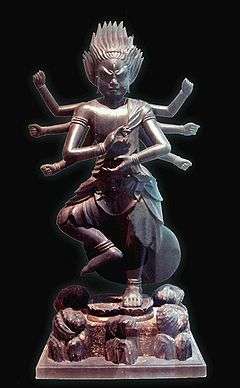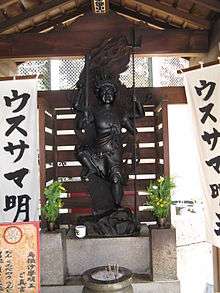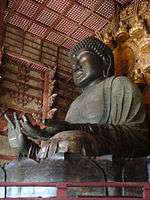Ucchusma
Ucchuṣma (Chinese and Japanese phonetic translations: 烏枢沙摩明王, 烏枢瑟摩明王, 烏瑟沙摩明王 or 烏芻沙摩明王; Japanese: Ususama Myōō; Chinese special name: 除穢金剛 Chúhuì Jīngāng, lit. "Vajra purifying the unclean") is a Vidyārāja in Mahayana and Vajrayana Buddhism. He is also known by various other names such as Burning Impurity Kongo, Jusoku Kongo (受触金剛) and Kazu Kongo (火頭金剛).
| Ucchuṣma | |
|---|---|
 The Wisdom King Ucchuṣma. | |
| Sanskrit | उच्छुष्म (IAST: Ucchuṣma) |
| Chinese | 烏樞沙摩 (Pinyin: Wūshūshāmó) 穢跡金剛 (Pinyin: Huìjì Jīngāng) 火頭金剛 (Pinyin: Huǒtóu Jīngāng), etc. |
| Japanese | (romaji: Ususama Myō'ō, Usushama Myō'ō, etc.) (romaji: Eshaku Kongoō) (romaji: Katō Kongō), etc. |
| Korean | 오추사마명왕 (RR: Ochusama Myeongwang) 예적금강 (RR: Yejeok Geumgang) 화두금강 (RR: Hwadu Geumgang), etc. |
| Tibetan | Wylie: Khro bo sMe brtzegs mNol ba med pa sMe ba brtsegs pa |
| Vietnamese | Ô xu sa ma minh vương Uế tích kim cương, etc. |
| Information | |
| Venerated by | Mahayana, Vajrayana |
| Attributes | Destroyer of defilements Toilet god |
His full name is Vajra Krodha Mahābala Ucchuṣma (Sanskrit; lit. "Great Strength Furious Diamond Ucchuṣma"). In Chinese this is translated as 大力威怒金刚烏芻使摩 (pinyin: Dàlì Wēinù Jīngāng Wūchúshǐmó), from the Chinese version of the Sūtra of Mahābala and the Tibetan version of the Ārya-Mahābalanāma Mahāyāna Sūtra.
Japan
In Japan, Ucchuṣma is venerated in several schools of Buddhism, including Tendai, Shingon, Zen and Nichiren. He is recognized as a guardian of the bathroom, where his effigy is often present. He is known to the general public for his powers of purification of the unclean, in particular in respect to sexual diseases.[1][2]
Ucchuṣma was also thought to be able to change a female fetus into a male one.[3]
Temples
A non-exhaustive list of temples that enshrine Ucchuṣma are as follows, arranged according to tradition:
Śūraṅgama Sūtra
According to the Śūraṅgama Sūtra, Shakyamuni Buddha asked the bodhisattvas and arhats to present their methods of understanding the ultimate truth. The eighteenth person to present his character was Ucchuṣma. The Sūtra states:
- Ucchuṣma came before the Buddha, put his palms together, bowed at the Buddha’s feet, and said to the Buddha, "I can still remember how many kalpas ago I was filled with excessive greed and desire. There was a Buddha in the world named King of Emptiness. He said that people with too much desire turn into a raging mass of fire. He taught me to contemplate the coolness and warmth throughout my entire body.
- A spiritual light coalesced inside and transformed my thoughts of excessive lust into the fire of wisdom. After that, when any of the Buddhas summoned me, they used the name 'fire-head.'
- From the strength of the fire-light samādhi, I accomplished Arhatship. I made a great vow that when each of the Buddhas accomplishes the way, I will be a powerful knight and in person subdue the demons' hatred.
- The Buddha asks about perfect penetration. I used attentive contemplation of the effects of heat in my body and mind, until it became unobstructed and penetrating and all my outflows were consumed. I produced a blazing brilliance and ascended to enlightenment. This is the foremost method."[4]
Ucchuṣma Vajrapāla Sūtra
The Ucchuṣma Vajrapāla Sūtra asserts that Ucchuṣma is actually the Vajra manifestation of Shakyamuni Buddha. Legend has it that when Shakyamuni Buddha was about to enter into Nirvana, all heavenly beings, with the exception of the ‘Spiral Hair-knot Brahma King’, came to pay their respect to Buddha. The Brahma King was in fact enjoying himself with the heavenly maidens in his own celestial palace. The heavenly gods, being unhappy with the arrogance of the Brahma King, went to his abode and try to persuade him to attend the Dharma assembly. Upon reaching his palace however, the gods found themselves trapped in the defiled energy cast by the supernatural powers of the king. Even some of the Vajra Deities (金剛神) who were later sent to apprehend the Brahma King were imprisoned by the foul forces as well.
When Shakyamuni Buddha came to learn of this, He employed His Original Wisdom (本智), and the Light of Perpetual Joy and Pliancy was emitted from His heart. Ucchuṣma Vajrapāla (穢跡金剛) soon appeared from amidst the revolving radiance of the Buddha’s heart, and ascended to the celestial palace of the Brahma King. Despite the defiled energy hurled at Him by the Brahma King, Ucchuṣma was unharmed as he immediately turned these forces of contamination into ordinary soil. In no time, the Brahma King was subdued and brought to the feet of Shakyamuni Buddha. For this reason, Ucchuṣma is also known as the "Filth-Eliminating Vajrapāla" (不淨金剛).[5]
Mantras
According to the Ucchuṣma Vidyārāja Dhāraṇi, the mantra provided should be recited forty thousand times by any good man or good woman who is besieged with ailments inflicted by evil spirits. On the tenth day of purification, it should be recited one thousand eight times resulting in the removal of myriad afflictions. The mantra is as follows:
- Oṃ vajra-krodha mahābala hana daha paca mātha vi-kiraṇa vidhavaṃsaya ucchuṣma-krodha huṃ huṃ huṃ phaṭ phaṭ phaṭ svāhā[6]
The short dhāraṇi of Ucchuṣma Vajrapāla:
- Oṃ krodhana hūṃ jaḥ
Mantras for other purposes:
- Oṃ śūri śūri mahā-śūri śūśūri svāhā (Purification of speech)
- Oṃ śutāri śutāri śumari śumari svāhā (Purification of action)
- Oṃ śrimali mamali mali śuśri svāhā (Removal of filth)[7]
Notes
- Williams, Duncan Ryuken (2005). The other side of Zen : a social history of Sōtō Zen : Buddhism in Tokugawa Japan. Princeton, N.J.: Princeton University Press. ISBN 0691119287. OCLC 54479202.
- Baroni, Helen Josephine. (2002). The illustrated encyclopedia of Zen Buddhism (1st ed.). New York: Rosen Pub. Group. ISBN 0823922405. OCLC 42680558.
- The Taiheiki : a chronicle of medieval Japan. McCullough, Helen Craig. Rutland, Vt. ISBN 0804835381. OCLC 86222702.CS1 maint: others (link)
- The Surangama Sutra with Commentary - Volume 5 - Explained by Venerable Master Hsuan Hua p.94
- Ucchusma Vajrapala Sutra
- "秽迹金刚说神通大圆满陀罗尼梵音". Youtube. 馬來西亞萬撓佛教會 Rawang Buddhist Association, Selangor, Malaysia. Retrieved 2019-06-25.
- "常見經本真言集" (PDF). wisdombox.com. Retrieved 2019-06-25.
External links


